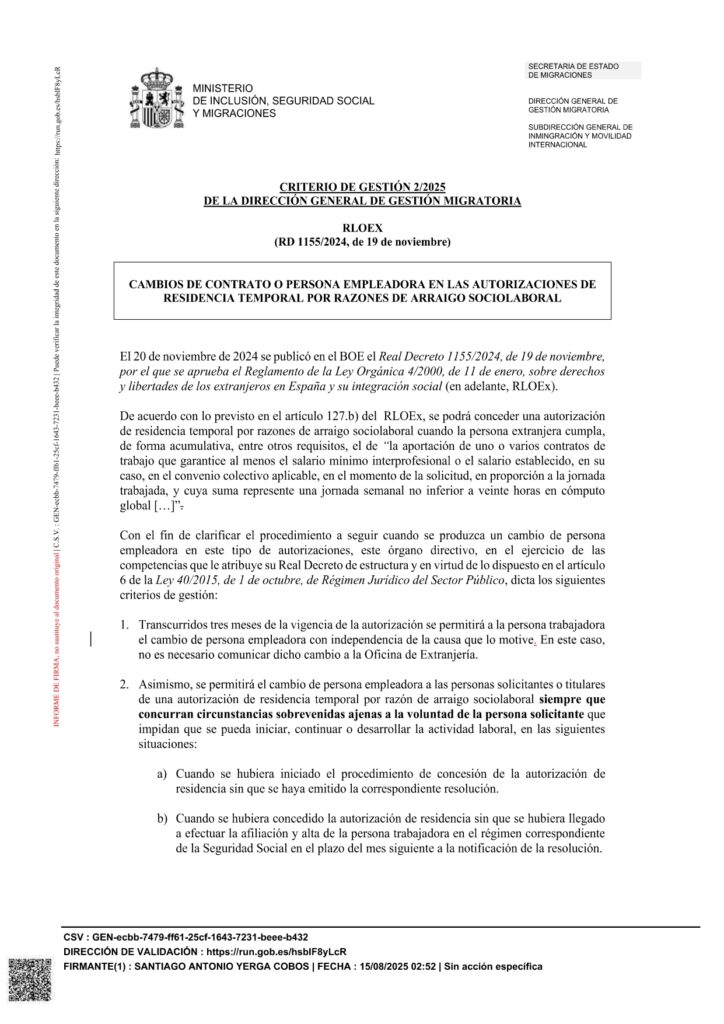Socio-labor roots (“arraigo sociolaboral”) is one of the most important types of residence permits granted under exceptional circumstances in Spanish immigration law. It is regulated in Article 127 of the Regulation of Organic Law 4/2000 (RLOEx, approved by Royal Decree 1155/2024), which establishes that a foreign national may obtain this permit if they prove ties with Spain and provide one or more employment contracts guaranteeing at least the minimum interprofessional wage or the wage set in the applicable collective agreement, provided that the total working hours are no less than 20 hours per week.
However, in practice, frequent questions arise: What happens if the employer changes? What if the contract is never executed, or if the employment relationship ends prematurely? To provide legal certainty and unify criteria, the Directorate-General for Migration Management has issued Management Guideline 2/2025, which establishes the applicable rules in such cases.

1. Employer change after three months of validity in socio-labor roots
One of the clearest innovations is that once three months of the residence authorization have passed, the foreign national may change employers without needing to justify the reason and without the obligation to notify the Immigration Office.
This criterion provides greater flexibility, recognizing that after an initial minimum period of stability, the foreign worker has the right to seek better job opportunities without risking their residence permit.
2. Employer changes before three months or in exceptional circumstances
The document also foresees scenarios where it is possible to modify the contract or employer before those three months, provided that circumstances beyond the foreign worker’s control prevent starting or continuing the employment relationship. These situations include:
- When the application is still pending: i.e., there is no resolution yet, but the initial contract cannot be fulfilled.
- When a favorable resolution has been issued but no registration with Social Security occurs within the following month.
- When there is an immediate registration and termination in Social Security within the month after the resolution.
- During the initial validity, before three months have elapsed, provided that the termination of the contract is not the worker’s fault.
In such cases, the applicant must notify the Immigration Office and submit the new contract (or contracts).
3. Deadlines for notifying the change
The general rule is that the foreign worker has two months to present the new contract from the moment they became aware of the circumstances prompting the change.
In the specific case where there was no registration with Social Security (case b), the deadline is stricter: one month after the expiration of the original registration deadline.
4. Multiple contracts and minimum working hours
The guideline clarifies that if several contracts are presented, the sum of them must amount to at least 20 hours per week, as required by Article 127.b) of the RLOEx. If one of the contracts is terminated and the total drops below this threshold, the applicant may submit additional contracts to maintain the validity of the residence authorization.
This point is particularly relevant in sectors such as hospitality, agriculture, or caregiving, where part-time contracts are common.
5. Changes during appeal proceedings
Management Guideline 2/2025 also allows the modification of the employment contract during an administrative appeal (recurso de reposición).
If the appeal is upheld, the foreign national will have two months to notify Immigration of the new contract. In this case, the residence authorization is not interrupted at any time, provided that registration with Social Security occurs within the month following the notification.
6. Requirements for new contracts
Any new contract must meet the requirements of Article 127.b) of the RLOEx: guaranteeing at least the minimum wage (or that of the collective agreement) and ensuring a minimum of 20 hours per week.
In addition, if the change relates to authorizations granted under the previous regulation (Regulation RD 557/2011, Art. 124), the new contracts must comply with the conditions established in that legal framework.
7. Procedure and communication channels
The communication of changes must follow the general rules of the RLOEx. For this purpose, the Mercurio platform will be enabled, allowing the electronic submission of contracts and supporting documents.
8. Application to social roots under the previous regulation
Finally, the guideline extends these same rules to holders of social roots residence permits regulated by RD 557/2011, ensuring consistency in their management.
Conclusion
Management Guideline 2/2025 represents an important step toward providing legal certainty for foreign nationals who obtain residence through socio-labor roots. By making it easier to change contracts and employers, it adapts to the realities of the labor market, where early terminations, part-time contracts, and job mobility are common.
The possibility of changing employers without restrictions after three months, and the provision of specific scenarios for changes before that period, ensures that foreign workers are not left in an irregular situation for reasons beyond their control.
Moreover, the requirement to always maintain the minimum 20-hour weekly threshold and meet wage conditions guarantees that authorizations remain linked to genuine and dignified employment, preventing precarious situations.
Ultimately, this criterion balances the protection of foreign workers’ rights with the administrative control of residence conditions, contributing to clearer and fairer management of socio-labor roots in Spain.
Our Legal Assistance
At Guilherme Cesar Immigration Lawyer, we provide specialized legal assistance in socio-labor roots cases and in all procedures related to the new Immigration Regulation (RLOEx). Our team of lawyers is ready to support you at every stage of the process: from the initial application to the management of contract or employer changes, renewals, and administrative appeals. If you need a clear and secure legal strategy for your immigration case in Spain, you can rely on our experience and professional commitment.

